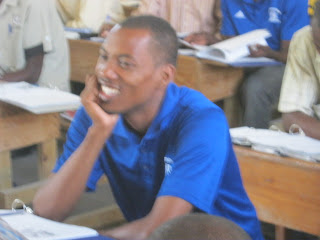Yesterday, in preparation for this training, we packed up 25 boxes of Christian books to be distributed to each of our 100 teams. It took a team of 4-6 of us almost 7 hours to sort, count and pack up these books!
These boxes contain 18 copies for each team of the Bible study books we will be using with our players this year:
1) Confessions of the Faith (a booklet that explains basic doctrines)
2) How to walk on the Path to Life (This explains the road we all take to salvation in Christ)
3) Good News concerning Jesus (A Bible study based on the Gospel of Mark)
4) Growing in the Christian Life (The basics of starting our new life in Christ)

In addition, they contain books that our Chaplains can use for their own spiritual growth and some story books they can read to the players like "Pilgrims Progress" and "Greasy the Robber" a testimony of how God a saved a band of robbers in Russia.



In all we packed over 8,000 books to help our leaders and players grow in Christ!
We also worked on translating our training curriculum from English to French and Creole. There is a joke, but I think it is really true: Did you know that French is the language of heaven? No, really, How do you know that? Because French is so hard that only in heaven will they really speak and write it perfectly." Do you remember how the Bible talks about "jots and tittles".
"Matthew 5:18
For verily I say unto you, Till heaven and earth pass, one jot or one tittle shall in no wise pass from the law, till all be fulfilled." (KJV)
Well, French has lots accent marks and spelling in French is a nightmare!
So that's why I really respect Carol as a French teacher!
In any event, our faithful helper, Paules, had the job of translating and editing our French and Creole documents.

So please pray for us as we continue to make preparations. There is still equipment to pack, Evangelism materials to put together, and lots of things to buy, like food and drink for over 130 people!
















